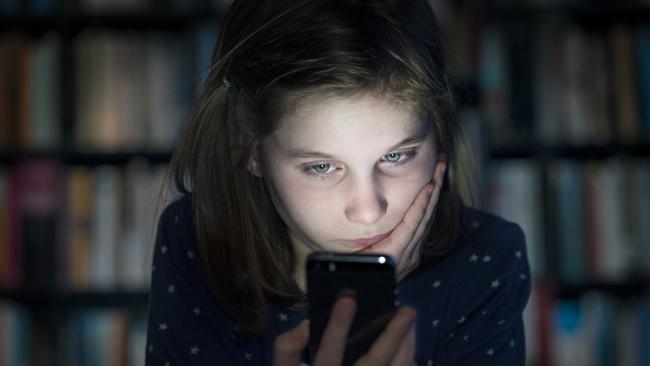Smartphone ‘addiction’ surging in young kids
An alarming study has prompted experts to warn parents to take action now or risk their kids developing a “smartphone addiction” and severe sleep issues.

Victoria
Don't miss out on the headlines from Victoria. Followed categories will be added to My News.
More than a quarter of children aged eight to 11 and the vast majority of older kids are on their phones after 10pm.
The alarming findings from a study of 250,000 Aussie kids aged eight to 18 have prompted researchers to warn of a growing risk of “smartphone addiction’’ and severe sleep issues, calling on parents to set stronger boundaries.
Kids from 644 private and public schools across 7546 suburbs across Australia were quizzed on their late note phone habits as part of the research.
The study found 28 per cent of eight to 11-year-olds, 57 per cent of children aged 12 to 14 and 80 per cent of those 15 and over send messages or receive calls between 10pm and 6am at least once a week.
This affects the likelihood of them getting the minimum recommended amount of eight hours sleep for children their age, the University of South Australia research published earlier this month found.
Data for the national study was provided by Resilient Youth Australia and involved 84,000 children aged eight to 11, nearly 100,000 children aged 12 to 14 and 67,000 older adolescents aged 15 to 18.

“Given their portability and capacity to be used unsupervised, a growing concern is the intrusion of mobile phones in the bedroom and the consequences for child sleep,” co-author Prof Kurt Lushington said.
“Mobile use prior to or at bedtime may potentially delay sleep onset while mobile phone use after bedtime may potentially fragment and displace sleep.
“A further contributing factor may be the effect of screen-light on circadian phase and a delay in sleep timing.”
The Porima family from Williams Landing give responsibility to their teenagers to monitor their own screen time at night.
“They have their own phones and social media accounts,” mum Ana Porima said.
“We used to restrict screen time, especially at night, when they were younger. But now we just monitor. I feel like they know what to do and can take on that responsibility.”
But the Mills family enforces strict screen time rules on their teens.
“We’ve always had the rule that phones don’t go with you to your bedroom,” dad Matt Mills said.
“There’s also no phones full stop after bedtime, which is around 8pm.’’
Mr Mills did not want devices “interfering’’ with his son Jack’s sleep.
“We find he communicates better with people when he’s not glued to his screen,” he said.
“If there’s ever a slight behaviour change for the worse we pick up on it straight away.”
More than half Australian children own smart phones by the time they are eleven.
Dr Lushinton said it was “likely that a proportion of frequent users in the present study would meet the criteria for ‘smartphone’ addiction”.
“For all age cohorts, using a mobile phone at night was a significant predictor of sleeping less than eight hours most nights,” he said.
Australian guidelines recommend an uninterrupted nine to 11 hours of sleep per night for those aged five to 13 years and eight to 10 hours per night for those aged 14 to 17 years.
UK researchers have found symptoms of smart phone addiction include a feeling of panic if it is not nearby and usage undermining other activities.
One study from King’s College London assessed the phone use of 41,000 children and young adults and found one in four young people had problematic phone usage. Associated issues included a lack of sleep, anxiety, stress and depressive behaviours.
More Coverage
Originally published as Smartphone ‘addiction’ surging in young kids




